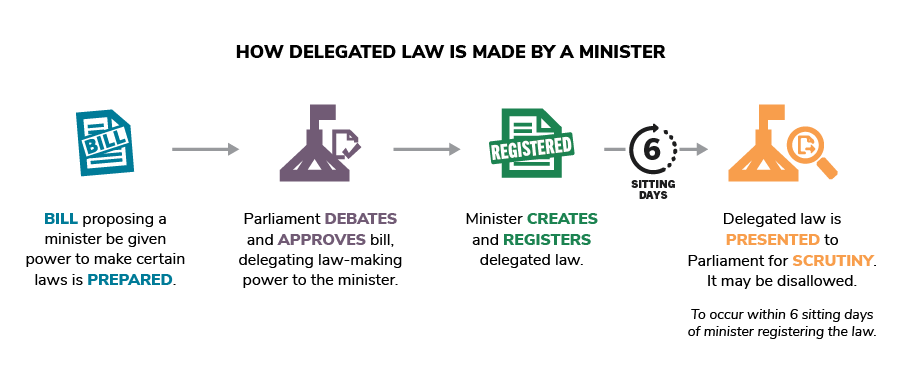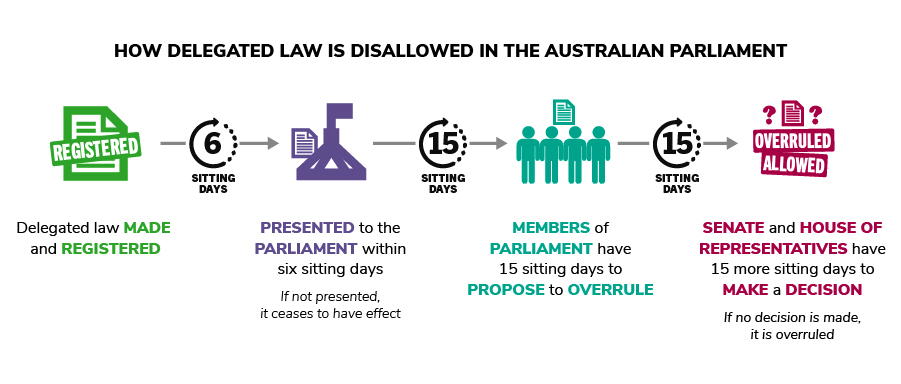Delegated law
Delegated law gives government ministers and others the power to make decisions about the details of laws passed by the Australian Parliament. This fact sheet explains how regulations and other types of delegated law are made and overruled.
What will I learn?
- Delegated law is made by office holders under the authority of a law.
- It allows the details of laws to be developed by those with expert knowledge of the area.
- Most delegated law can be overruled by the Australian Parliament.
Curriculum alignment
Year 8 ACHCK063
What is delegated law?
Delegated law is law made by a minister, other office holder or government department using power given to them in an existing law. Delegated law has the same power as a law made by the Australian Parliament.
Delegated law is often called subordinate law or secondary legislation because it is made under the authority of a law made by the Australian Parliament. It can be made and changed without having to be debated and passed by the Parliament.
How delegated law is made by a minister

Parliamentary Education Office (peo.gov.au)
Description
A minister gets the power to make delegated law when:
- A bill proposing a minister be given power to make certain laws is prepared.
- Parliament debates and approves the bill, delegating law-making power to the minister.
- The minister creates and registers delegated law.
- The delegated law is presented to Parliament for scrutiny. It may be disallowed. This must occur within 6 sitting days of the minister registering the law.
Other officials or heads of government departments may be given the power to make delegated law in the same way.
Copyright information
This work is licensed under a Creative Commons Attribution-NonCommercial-NoDerivs 3.0 Unported License.
You are free to share – to copy, distribute and transmit the work.
Attribution – you must attribute the work in the manner specified by the author or licensor (but not in any way that suggests that they endorse you or your use of the work).
Non-commercial – you may not use this work for commercial purposes.
No derivative works – you may not alter, transform, or build upon this work.
Waiver – any of the above conditions can be waived if you get permission from the copyright holder.
How delegated law is made by a minister

Parliamentary Education Office (peo.gov.au)
Description
A minister gets the power to make delegated law when:
- A bill proposing a minister be given power to make certain laws is prepared.
- Parliament debates and approves the bill, delegating law-making power to the minister.
- The minister creates and registers delegated law.
- The delegated law is presented to Parliament for scrutiny. It may be disallowed. This must occur within 6 sitting days of the minister registering the law.
Other officials or heads of government departments may be given the power to make delegated law in the same way.
Copyright information
This work is licensed under a Creative Commons Attribution-NonCommercial-NoDerivs 3.0 Unported License.
You are free to share – to copy, distribute and transmit the work.
Attribution – you must attribute the work in the manner specified by the author or licensor (but not in any way that suggests that they endorse you or your use of the work).
Non-commercial – you may not use this work for commercial purposes.
No derivative works – you may not alter, transform, or build upon this work.
Waiver – any of the above conditions can be waived if you get permission from the copyright holder.
Purpose of delegated law
Laws made by the Australian Parliament are often about big, complex issues that affect many Australians. These laws provide a general framework and don’t include details about when, where and how the laws might be applied.
The Parliament can give the power to make decisions about the details of these complex laws to the person or group with expert knowledge of the area. For example, the Minister for the Environment might make regulations about accessing camping in national parks, and the Department of Home Affairs may make the regulations for travel visas to Australia.
Delegated law can be made more quickly than passing a bill – proposed law – through Parliament. This means new rules can be made when they are needed, for example during an emergency.
Overruling delegated law
Each delegated law must be listed on a public register. It becomes law on the day it is registered. Then it must be presented to Parliament within 6 sitting days. After it has been published, it can be disallowed – overruled – by Parliament. To do this:
- Within 15 sitting days, a member of parliament must request the Senate or House of Representatives overrule the delegated law.
- The Senate or House of Representatives have 15 sitting days to discuss the delegated law and make a decision.
- If there is no discussion or no decision is made, the delegated law is overruled.
Some delegated law cannot be overruled. This might be because it deals with technical or scientific matters which the Parliament agreed are best decided by experts. Sometimes it is because of an urgent issue such as public health orders during the Covid-19 pandemic.

How delegated law is disallowed in the Australian Parliament.
Parliamentary Education Office (peo.gov.au)
How delegated law is disallowed in the Australian Parliament.

Parliamentary Education Office (peo.gov.au)
Description
This diagram illustrates how delegated law is disallowed. After delegated law is made and registered it must be presented to the Australian Parliament within 6 sitting days. (If it is not presented, it ceases to have effect.) Members of parliament have 15 sitting days to propose to overrule the delegated law. The Senate and House of Representatives they have 15 more sitting days to make a decision. If no decision is made, the delegated law is overruled.
Copyright information
This work is licensed under a Creative Commons Attribution-NonCommercial-NoDerivs 3.0 Unported License.
You are free to share – to copy, distribute and transmit the work.
Attribution – you must attribute the work in the manner specified by the author or licensor (but not in any way that suggests that they endorse you or your use of the work).
Non-commercial – you may not use this work for commercial purposes.
No derivative works – you may not alter, transform, or build upon this work.
Waiver – any of the above conditions can be waived if you get permission from the copyright holder.

How delegated law is disallowed in the Australian Parliament.
Parliamentary Education Office (peo.gov.au)
How delegated law is disallowed in the Australian Parliament.

Parliamentary Education Office (peo.gov.au)
Description
This diagram illustrates how delegated law is disallowed. After delegated law is made and registered it must be presented to the Australian Parliament within 6 sitting days. (If it is not presented, it ceases to have effect.) Members of parliament have 15 sitting days to propose to overrule the delegated law. The Senate and House of Representatives they have 15 more sitting days to make a decision. If no decision is made, the delegated law is overruled.
Copyright information
This work is licensed under a Creative Commons Attribution-NonCommercial-NoDerivs 3.0 Unported License.
You are free to share – to copy, distribute and transmit the work.
Attribution – you must attribute the work in the manner specified by the author or licensor (but not in any way that suggests that they endorse you or your use of the work).
Non-commercial – you may not use this work for commercial purposes.
No derivative works – you may not alter, transform, or build upon this work.
Waiver – any of the above conditions can be waived if you get permission from the copyright holder.
Checking delegated law
Just like bills, delegated law is scrutinised – closely examined – by the Parliament. The Senate Standing Committee for the Scrutiny of Delegated Legislation makes sure delegated law:
- is made properly in accordance with the existing law
- respects citizens’ rights
- can be reviewed by a court or tribunal
- does not contain content more appropriate for a new law.
This Committee can recommend the Senate overrule a delegated law.
The Parliamentary Joint Committee on Human Rights also makes certain the delegated law respects human rights.
